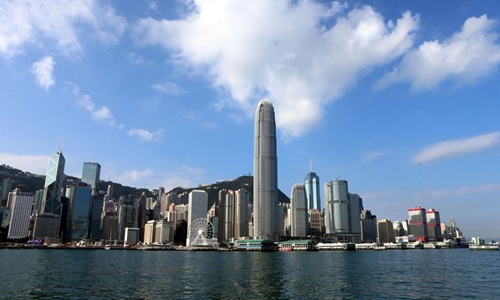If HK sneezes, US will feel the impact: Hong Kong finance secretary
Source:Global Times Published: 2020/6/14 22:13:41

File photo of the Victoria Harbor in south China's Hong Kong, on May 31, 2017. (Xinhua)
Paul Chan, financial secretary of the Hong Kong Special Administrative Region, said that Hong Kong is the world's third-largest foreign exchange center for the US dollar, and if Hong Kong sneezes, it will affect the US' interests. The city has the strength to deal with any impact, Chan said.
The comments came after US President Donald Trump threatened to end the city's special trade and customs status and limit its right to freely trade the US dollar.
There has been no capital outflow and the city is seeing stronger capital inflows than outflows, Chan said in a TV interview Saturday, despite media report that there is a rise in the number of local people who have inquired about opening offshore accounts, following the national security legislation for HKSAR by China's National People's Congress (NPC) in May.
He said that although the US could restrict trade in the US dollar in Hong Kong, such a move would definitely harm the interests of the US itself, as US companies and investment banks make huge profits in Hong Kong.
"Hong Kong is the third-largest place in the world for trading in US dollar, and it's closely connected with other global financial hubs. US financial institutions and investment funds have huge interests here. If we sneeze, it will affect US as well," Chan said.
There are fears that, if US moves to restrict US dollar trade in Hong Kong, it would raise foreign exchange risks and costs for more than 1,300 US companies operating in the city, Lin Jiang, a professor of economics at Lingnan University College at Sun Yat-sen University, told the Global Times Sunday.
"These US companies that earn profits in the local currency in the city will be facing high forex risks if they cannot exchange the local currency into US dollars," Lin said.
Chan said that the HKSAR is determined to defend the Linked Exchange Rate System, which ensures that the Hong Kong dollar exchange rate remains stable within a band of HK$7.75-7.85 per US dollar.
He added that the system has been working for 30 years and the operation of the system doesn't need to seek consent from the US as long as Hong Kong is able to keep the exchange rate stable.
The city has a base of foreign exchange reserves of more than $442 billion, equal to six times the city's currency in circulation as of end-May, according to Hong Kong Monetary Authority.
Chan said that if the US implements such restrictions on Hong Kong, it could weigh on business confidence among international investors in terms of holding US dollar assets and therefore all parties will have to move cautiously.
Posted in: ECONOMY,BIZ FOCUS